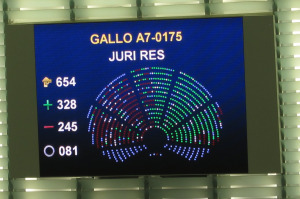Christian Engström's Blog, page 51
March 28, 2013
Om inte EU blir mer demokratiskt, då är det dags för Sverige att gå ur
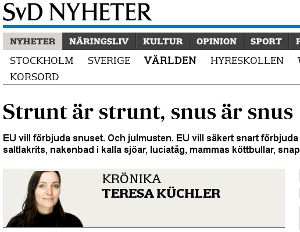
Läs Teresa Küchlers krönika i SvD
Vilka EU-nyheter är viktiga, på riktigt? Var fattas besluten i EU, egentligen? Det är frågor som Svenska Dagbladets Teresa Küchler tar upp i sin EU-krönika den 26 mars. Frågor som är stora, viktiga och svåra att svara på.
Men det är nödvändigt att söka svar. 60 till 80 procent av alla svenska lagar och regleringar kommer från EU. Tyvärr får svenska folket nästan aldrig veta vad som är på gång, vilket är ett demokratiskt problem. Politik är en verksamhet som medborgarna bör vara delaktiga i – inte något som plötsligt drabbar passiva och oinformerade åskådare.
Küchler går hårt åt sina kollegor i media, som hon menar bara går på de allra enklaste och rubrikvänligaste nyheterna. Det ligger något i detta. Därmed inte alls sagt att de enkla och rubrikvänliga nyheterna skulle vara oviktiga. Men man skulle kunna önska sig en mer blandad kompott.
Problemet är inte att svenska media rapporterar för mycket från EU. Det allvarliga är allt man missar. Saker som kommer att påverka vanligt folk, företag och den svenska politiken – som nu ofta kommer som en blixt från klar himmel, när allt redan är för sent för att påverka.
Vill man veta vad som sker i EU, då måste man ofta välja utländska media eller följa ett antal av de rätt specialiserade politiska bloggar som bevakar EU. Detta lämnar det stora flertalet, som är beroende av etablerade svenska media, i okunskap om vad som sker i en central del av politiken.
Küchler tar också upp den känsliga frågan om var beslut egentligen fattas. Spelar den formella behandlingen av ett ärende hos de folkvalda i Europaparlamentet egentligen någon roll? Görs allt ändå upp av ett litet frimureri av icke-valda byråkrater bakom stängda dörrar? Vad säger det, i så fall om tillståndet för vår demokrati? Och vad skall vi göra åt saken?
Vi piratpartister vill reformera EU genom att ta fram ett nytt fördrag. Det skall fokusera på att göra EU till en demokratisk verksamhet. Det skall slå fast våra medborgerliga fri- och rättigheter. Det skall ange enkla och begripliga spelregler för EU. Och politiskt skall det fokusera på fri rörlighet för varor, tjänster, människor och kapital.
Ett sådant nytt fördrag skall sedan underställas alla européer i en gemensam folkomröstning, vid ett och samma tillfälle. Därefter är det upp till medlemsstaterna att godkänna eller förkasta fördraget, på det sätt varje land finner lämpligt.
På detta sätt ger man demokratin i EU nytt liv. Om både folket och medlemsstaterna får säga sitt – då finns det i vart fall förutsättningar för ett mer demokratiskt, mer begripligt och rimligare fördrag. Vilket är ett första och helt nödvändigt steg för att komma till rätta med de problem som nämns i texten ovan.
För att media skall kunna rapportera från EU måste verksamheten vara begriplig. För att medborgarna skall kunna vara delaktiga krävs att EU är öppet och transparent. För att den demokratiska processen skall vara meningsfull krävs en möjlighet att utkräva ansvar. Det borde vara självklart.
EU måste bli mer demokratiskt, mer begripligt och mer transparent. Och det måste ske inom överskådlig tid. Om detta inte sker – då är det dags för Sverige att lämna EU. Det finns helt enkelt gränser för vad vi kan finna oss i.

March 25, 2013
Allowing snus in the EU could save 350.000 lives per year
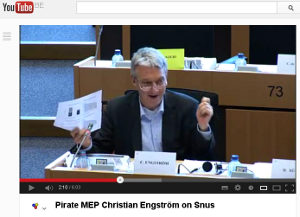
Watch my speech in IMCO on how snus could save lives in the EU (6 min)
Sweden has by far the lowest rates of people dying from smoking related diseases, compared to the other EU countries. The reason is very simple: we have by far the lowest rates of smoking.
In Sweden, smoking prevalence is 13%, compared to the EU average of 28%. (The second best EU country has a smoking prevalence of 23%, close to the average.) Half as many people smoke, which has led to half as many people dying from smoking in Sweden compared to the rest of the EU.
This is because snus is legal in Sweden (but not in any other EU country), which has given Swedish smokers the possibility to switch from smoking cigarettes to using snus. This represents a major health benefit, because although snus is not a healthy product in itself, snus is between 90 and 99% less dangerous than smoking.
If you are a smoker, the best thing is of course if you can give up all forms of nicotine use completely. But if you are unable or unwilling to do this, switching from cigarettes to snus is almost as good from a health perspective. Thanks to snus, Sweden is a remarkable success story in the fight against tobacco induced death and diseases.
It can often be tricky to compare numbers between different countries, as there can be many different factors that explain any differences in the numbers, but in this particular case it is pretty clear.
Sweden’s two closest neighbours, Denmark and Finland, both have twice the smoking prevalence of Sweden: 26% in Denmark, and 25% in Finland. Both Denmark and Finland are very culturally similar to Sweden, but yet smoking is twice as common there as it is in Sweden.
There simply is no other plausible explanation than snus why Sweden is doing so much better in its efforts to reduce smoking than the rest of Europe, including culturally similar Denmark and Finland.
Smoking kills 700.000 persons per year prematurely, according to the statistics presented by the European Commission. I have no reason to doubt these statistics. Tobacco smoking is the number one preventable cause of death in the developed world.
This means that if we could reduce smoking in the rest of the EU down to Swedish levels, we would save 350.000 lives per year.
Against this background, I find it completely unacceptable that the EU Commission proposes to continue the present ban on snus in all the EU countries except Sweden. With this many lives at stake, it is quite simply immoral that the Commission is not even prepared to let member states who would want to follow Sweden’s example, and use snus as part of a harm reduction strategy, to do so if they want to.
This is, in essence, what I said last week in the Committee for the Internal Market and Consumer Protection IMCO, when we had an exchange of views on the revision of the Tobacco Products Directive.
By lifting the ban on snus on the EU level, and allowing each member state to develop its own policy in this area, we can potentially save hundreds of thousands of lives per year in Europe. Not exploring this possibility is just immoral.
You can watch the video of my intervention on Youtube (6 min).
Read more about how the European Commission is actively massaging and distorting its own scientific evidence to support a continued ban on snus.
With so many lives at stake, we have an obligation to address this matter in a calm and evidence based manner, rather than upholding the EU ban on a smoke-free product that demonstrably saves lives.
…………
Declaration of interest: I am a snus user, which has allowed me to cut down my smoking drastically, even though I have not stopped completely yet. My wife used to smoke, but gave it up completely several years ago by switching to eucalyptus flavoured snus.

March 20, 2013
Det är väldigt kul att vara MEP för Piratpartiet
Jag var på en mottagning arrangerad av den amerikanska handelskammaren AmCham tidigare ikväll. Det var tal från podiet om hur fantastiskt bra det kommer bli med det nya frihandelsavtalet som ska börja förhandlas mellan EU och USA.
Medan jag lyssnade stod jag bredvid en handelsattaché från den amerikanska ambassaden, som jag just hade börjat prata med, och förklarat för att jag representerade det svenska Piratpartiet.
När talen var slut (och gudskelov var de faktiskt korta på riktigt den här gången), vände jag mig mot attachén och sa att jag höll med om att det kommande frihandelsavtalet var en jätteintressant fråga.
- Vi är så otroligt stolta över att vi lyckades stoppa ACTA-avtalet, sa jag och log med hela ansiktet. Och det är fantastiskt, nu finns det flera hundratusen människor som har varit ute på gatorna i Europa och demonstrerat mot ett frihandelsavtal. Om det nya EU-USA-avtalet innehåller ett ”IP-kapitel” om upphovsrätt och patent kommer det bli så mycket lättare att mobilisera motstånd nästa gång.
Och så log jag en gång till. 
Det är verkligen kul att ha förmånen att få representera Piratpartiet i Europaparlamentet, och få den här typen av tillfällen.
Det var alla engagerade medborgare som tog till gatorna eller mejlade EU-parlamentariker som gjorde att vi kunde stoppa ACTA-avtalet.
Ryktesvis pratas det om att EU-kommissionen (som fungerar som EU’s regering, fast den inte är vald) blev uppriktigt skakad när hundratusentals medborgare, först i Polen och sedan i resten av Europa, gick ut i januari- och februarikylan 2012 och protesterade mot ett ”frihandelsavtal” som inte hade ett dugg med frihandel att göra, utan bara var ett försök att gå runt de demokratiskt valda lagstiftande församlingarna och bakvägen tvinga internetleverantörerna att bli fildelningspoliser.
Det är väldigt bra om EU-kommissionen kommer ihåg den känslan, och det är ännu bättre om USA förstår att det inte kommer att fungera att försöka köra samma trick en gång till.
Jag hoppas den amerikanska attachén gör det som diplomatiska attachéer är till för, och rapporterar den här konversationen hem till dem som kommer sköta förhandlingarna mellan USA och EU.
Annars kan det bli så att vi måste ut och demonstrera igen i femtongradig kyla för att få behålla friheten på nätet. Men behövs det så gör vi det. Vi har redan gjort det en gång och vunnit.

March 15, 2013
The EU parliament (mostly) said no to a porn ban
The European parliament’s vote earlier this week on a resolution that asked for a ban on all forms of pornography in the media was not entirely easy to interpret, but the most reasonable political interpretation is to say that the parliament said No to a ban on porn.
But let’s take a closer look at the different articles that the parliament voted on.
First, Article 14:
14. Points out that a policy to eliminate stereotypes in the media will of necessity involve action in the digital field; considers that this requires the launching of initiatives coordinated at EU level with a view to developing a genuine culture of equality on the internet; calls on the Commission to draw up in partnership with the parties concerned a charter to which all internet operators will be invited to adhere;
The parliament rejected this article completely, which is very good. If it had not, it would have called for turning the internet service providers into some kind of private ”porn police”, very much along the same lines as the ACTA treaty that wanted to turn them into a private file sharing police.
The rejection of this article was a clear and very important victory for free speech and information freedom.
Then, Article 19:
19. Calls on the Member States to establish independent regulation bodies with the aim of controlling the media and advertising industry and a mandate to impose effective sanctions on companies and individuals promoting the sexualisation of girls;
This article asked member states to establish regulation bodies with the aim of controlling the media and a mandate to impose sanctions on companies and individuals. That kind of mechanism has no place in a democratic society.
The rejection of this article as well was another clear victory for freedom of speech.
Finally, Article 17:
17. Calls on the EU and its Member States to take concrete action on its resolution of 16 September 1997 on discrimination against women in advertising, which called for a ban on all forms of pornography in the media and on the advertising of sex tourism
Here, the parliament rejected the second half of the article with the explicit call for a ban on all forms of pornography in the media, but kept the first part with the indirect reference to the resolution from 1997.
This is where it gets tricky and a bit ambiguous.
On the one hand, the parliament rejected the direct call for a ban. So far, so good. The parliament no longer highlights that particular article in the old resolution. If the highlighting had remained, it would have been clear that the parliament did in fact want a ban on porn in media, but since it was taken away,
But on the other hand, Article 5 of the 1997 resolution still contains a call for ”statutory measures to prevent any form of pornography in the media”, and the parliament expressed that it wanted that resolution implemented, without mentioning any exceptions.
So how should we interpret this?
The reasonable political interpretation is that the parliament does not want to ban pornography on the internet or in the media.
If this had been a legislative report, it would have been correct to say that the parliament wanted to ban porn in magazines, TV and DVDs. Legal texts are quite similar to computer code (although courts are quite different from computers), so in that case an indirect reference would be just as strong as a direct mention of the porn ban.
But this is a political resolution where the parliament just expresses an opinion, and then it has to be read in a different way. From a political perspective, the important thing is that the parliament actively removed the wording ”a ban on all forms of pornography in the media” (and remove all the sharp proposals on how to enforce it). If the majority had in fact been in favour of a ban, it would have had no reason to do this. Since it did, the only reasonable conclusion is that the majority of members didn’t want a ban.
This is a victory, and that’s what counts in the political landscape in Brussels.
Thank you, all activists who contributed by sending emails to MEPs or in other ways!

March 14, 2013
More transparent voting in the European Parliament
The big screen after a roll call vote [in 2010]. Click to find details about the vote at VoteWatch.eu
After this week’s vote on the Report on eliminating gender stereotypes in the EU, where we (mostly) managed to get rid of a proposal to ban all forms of porn in media and on the internet, several people have asked what the numbers were in the key votes, and which members of the European parliament voted for or against the porn ban, respectively.Unfortunately, there is no way I can answer those questions, as the votes were done by a show of hands, and the exact results were not recorded. Strange as it may seem, this is how most votes in the European parliament are conducted.
I republish a blog post I wrote in 2011 that explains the background:
The European institutions need to become a lot more transparent, if they want to have any chance of gaining the confidence of increasingly eurosceptic citizens. The European Parliament is by far the best of the three institutions, and much more open and transparent than the Council or the Commission.
But the Parliament could improve, too.
When we vote in plenary in the European Parliament, we have an electronic voting system that is used to make ”roll call votes” (RCV). It works just as you would expect. A big screen tells you which item you are voting at the moment, and you have a few seconds to press one of the three buttons for yes, no, or abstain.
When the vote has been closed, the big screen displays the votes cast, both in numbers and with little green, red or white dots representing the individual members (MEPs) who took part in the vote. Afterwards, the information about how each MEP voted is made public, and there are sites like ItsYourParliament.eu and VoteWatch.eu where you can check how individual MEP voted.
It is a perfectly good system, but there is one problem.
For most of our votes, the electronic system is not used. Instead, we vote by raising our hands the second the President (speaker) says ”in favour”, ”against”, or ”abstentions”. The President then makes a judgement as to whether it was a yes or a no, and calls out his decision.
If he is uncertain, he can call for an ”electronic check”. We then redo the vote using the electronic system.
If an MEP feels that the President may have misjudged the outcome of a vote done by show of hands, he can demand an electronic check by shouting ”Check!” when the President has made his call. As I understand the Rules of Procedure for the Parliament, a check should always be carried out if a MEP requests it, but frequently the President ignores calls of ”Check!” from the floor, if he feels confident that he was right in his call.
After an electronic check the number of votes in favour, against, and abstentions are displayed on the big screen, but not the little dots representing the individual MEPs.
No data on how the individual MEPs voted is saved in these normal votes, regardless of whether they are completed by show of hands (where it would be impossible) or electronic check (where the data exists, but is discarded).
In the majority of votes that are not roll call votes, neither citizens nor other MEPs can check how a particular MEP voted.
I think all votes in plenary in the European Parliament should be carried out as roll call votes (except possibly minor points of order). This is a way to increase the transparency of the Parliament in a simple and straight-forward way, that can be implemented immediately and does not even cost any money. The electronic voting system is already there and has been paid for, whether we use it or not.
The standard argument against having all votes as RCVs is that it would take more time. I seriously doubt that this is true. The show-of-hands procedure is perhaps slightly quicker when everything goes smoothly, but if you add the time that the (fairly frequent) calls for electronic checks take, it often feels like it would have been quicker if we had done it all by roll call votes from the start.
There was a discussion in plenary in Strasbourg this week [in 2011] that resulted in one member asking for all the votes of a (random) report to be carried out as RCVs. The President granted the request, and it did not feel like the vote took any longer than it would have if we had voted the way we normally do.
And even if it were to be shown that it does in fact take slightly longer on average, I think we should still use roll call votes all the time. The Swedish national parliament has done so since it first got an automatic voting system, and I believe it is the same in national parliaments more or less everywhere.
MEPs are elected to represent the people who voted for them. Of course the voters should have the possibility to check how their representatives are doing their job.
To have all votes in plenary as roll call votes is a straight-forward reform to increase transparency in a concrete way. The European Parliament can implement at no cost and without delay, it it wants to.
I think we should.

March 13, 2013
Tal i EU-parlamentet: ”Jag ser inget negativt med pornografi”
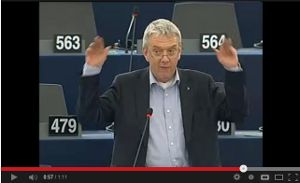
Se mitt tal i EU-parlamentet (1 min)
I måndags debatterade EU-parlamentet rapporten ”Avskaffande av könsstereotyper i EU”. Jag fick en minuts talartid och sa så här:
Herr talman! Jag håller helt med rapportören fru Liotard om att gammaldags och omoderna könsstereotyper är något dåligt som borde elimineras, eftersom de låser fast både män och kvinnor i roller som kanske inte passar just dem som individer. Målet måste vara ett samhälle där varje individ är fri att vara sig själv, vare sig hon är man eller kvinna.
Men jag kommer ändå att rösta nej till rapporten på grund av dess innehåll. I artikel 17 ber man om ett förbud mot all form av pornografi i media. Det tycker inte jag är acceptabelt. Jag ser inget negativt med pornografi. Det är en populär form av underhållning och det ska var och en vara fri att bestämma själv.
Ännu värre blir det om man tittar på artikel 14, som säger hur det ska förbjudas. Det är internetoperatörerna som ska tvingas eller pressas eller uppmanas att skriva på en ”frivillig” stadga. Det är precis samma mekanism som i Acta-avtalet som parlamentet sade nej till. Vi bör säga nej också till den här resolutionen också, fastän målet med den är gott.
Omröstningen i plenum hölls i tisdags, och för att göra en lång historia kort så vann vi i huvudsak.
Vi stoppade förslagen om att internetleverantörerna skulle bli porrpoliser och att det skulle inrättas myndigheter med rätt att övervaka och bestraffa media. Rent tekniskt blev den antagna resolutionen delvis otydlig, men den rimliga politiska tolkningen är nog att EU-parlamentet sa nej till tanken att försöka förbjuda porr.
Tack alla som mejlade ledamöter i EU-parlamentet i frågan, eller hjälpte till att uppmärksamma den på andra sätt. Det var det som ledde till den här politiska framgången. Aktivism gör skillnad.

”En miljon mejl till EU blockerade”
P3 Nyheter rapporterar om EU-parlamentets tilltag att blockera mejl från medborgare som ville protestera mot EU-förslaget att förbjuda alla former av pornografi på internt, och citerar mig:
– Alltså, det är ju fullständigt absurt! Ett parlament som betraktar sina medborgares åsikter som spam – de personer som tycker det borde omedelbart avsäga sig sitt uppdrag, säger Christian Engström.
Läs mer eller lyssna hos P3 Nyheter
Som jag bloggade om igår har jag har skrivit till parlamentets talman och protesterat och bett om en förklaring.

March 12, 2013
Otydligt om porrförbud i EU
Pressmeddelande från Piratpartiet:
På tisdagen uttryckte Europaparlamentet sitt stöd för en resolution om att förbjuda all slags porr i media.
- Detta är oacceptabelt vad gäller viktiga demokratiska värden som yttrandefrihet och tryckfrihet, säger Christian Engström som är ledamot av Europaparlamentet för Piratpartiet.
Det märkliga är att Europaparlamentet beslutade att stödja den tidigare resolutionen (A4-0258/97) om att bland annat förbjuda all slags porr i media – och samtidigt att stryka de ord i dagens resolution som förklarade att det är just det man gör.
- Det här är nipprigt. Det avgörande är ju vad man har beslutat i sak, nämligen att stödja en resolution som bland annat vill förbjuda porr i media. Att stryka de delar av texten som förklarar vad man gjort, det ändrar inget i sak. Det är bara att försöka vilseleda medborgare och media, säger Christian Engström.
- Den goda nyheten är att de delar av resolutionen som ville reglera internet och media ur ett könsperspektiv föll. Det får ses som ett resultat av att Piratpartiet lyft fram det problematiska med dessa förslag. Nu slipper internetoperatörerna bli porrpoliser, säger Christian Engström.
Dagens resolution är inte lagstiftning, utan en så kallad inititivrapport. Vilket innebär att det är en uppmaning till EU-kommissionen (som är den enda institution i EU som har initiativrätt) att lägga fram lagförslag i linje med dagens beslut.
- Vi får hoppas att EU-kommissionen inser det orimliga i det beslut som har fattats i dag och därför avstår från att gå vidare med dessa frågor, avslutar Christian Engström.

Letter to the EU parliament president on blocking of emails from citizens #mepblock
I have now sent the following letter to the President of the European Parliament Martin Schulz:
Dear President Schulz,
On March 7, 2013, a large number of citizens tried to email Members of the European Parliament to express their views on the ”Report on eliminating gender stereotypes” in the EU, which had attracted public attention on the internet and in media.
Around noon, approximately 350 emails from concerned citizens had arrived, but then they suddenly stopped appearing.
This turned out to be because the parliament’s IT support department LSU MEP had taken the decision to block these emails by classifying them as spam, after some MEPs had requested this.
I find it completely unacceptable that the parliament’s IT support department deliberately blocks certain emails from genuine citizens wishing to contact their elected representatives, and I find it even more unacceptable that this was done at the request of some individual MEPs (whose names and political groups I do not know).
No MEP should have the power of shutting off communication between other MEPs and their constituents using the parliament’s technical staff and infrastructure.
I look forward to your confirmation that you share this view, and that you will take immediate and appropriate action to both solve the present situation and make sure it is not repeated in the future.
Yours sincerely,
Christian Engström, MEP
PS. This email has also been sent by fax, to make sure it is not stopped by the filtering.


March 9, 2013
Christian Engström (PP): ”Sex är inte något förnedrande”
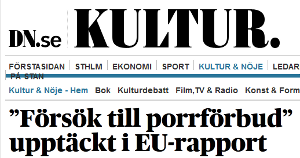
Läs artikeln hos DN
DN skriver om #mepblock-affären, alltså att Europaparlamentet överväger att uttala sig för ett generellt porrförbud, och dessutom har lagt in ett filter som sorterar bort mail från medborgare som vill uttrycka sin mening om rapporten ”Avskaffande av könsstereotyper i EU” där uttalandet om porrförbud finns.
Jag är citerad i artikeln, och får bland annat frågan:
Anser du inte att porr är objektifierande och förnedrande?
– Sex är inte något förnedrande. Jag kan inte heller se att det är något fel om samtyckande vuxna har sex med varandra, säger Christian Engström.
Han påpekar att det är människors rätt till privatliv som ligger Piratpartiet ”varmare om hjärtat” än produktionen och konsumtionen av pornografi. Christian Engström nämner Europeiska konventionen om skydd för de mänskliga rättigheterna.
– Artikel 8 säger att alla har rätt till skydd för sitt privat- och familjeliv, sitt hem och sin korrespondens.
Läs mer hos DN


Christian Engström's Blog
- Christian Engström's profile
- 1 follower


